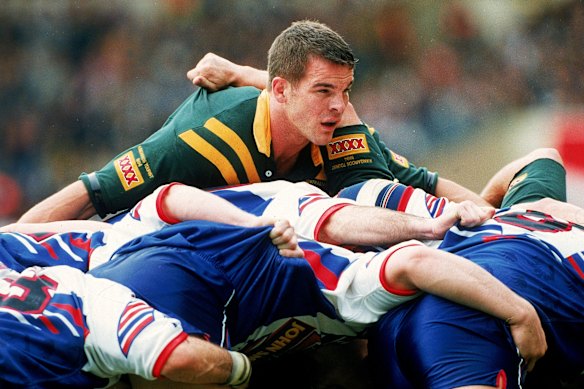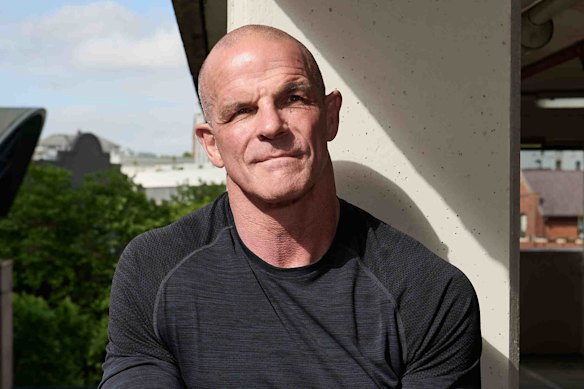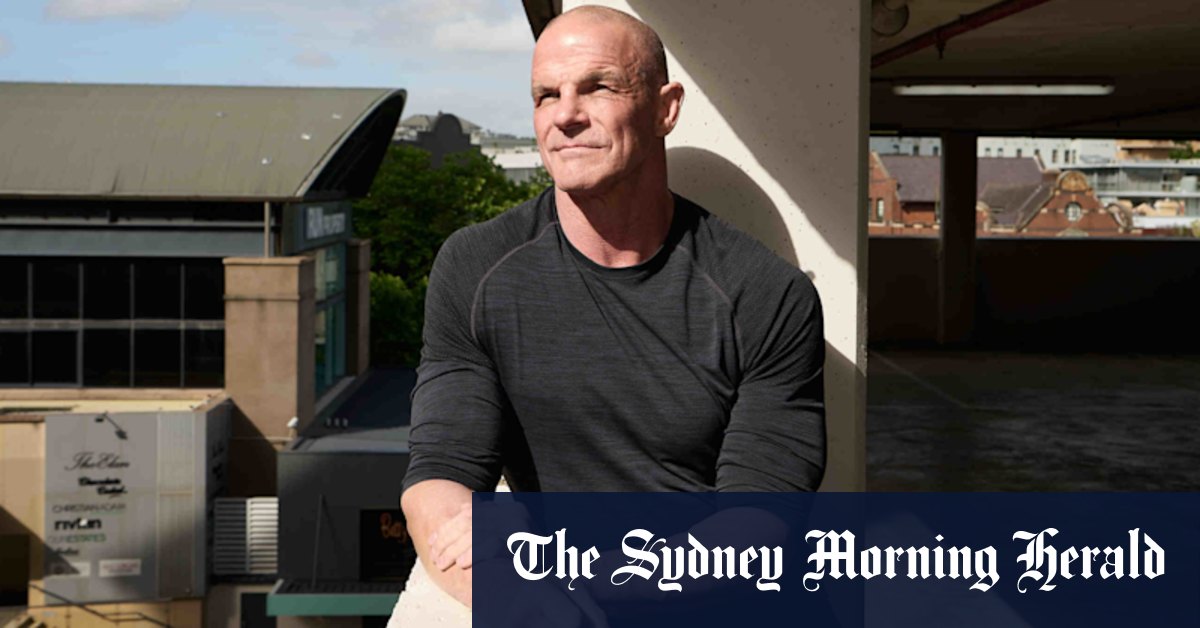Asked if they were senior players, Quayle replied: “Oh, very much so.”
The respected administrator added that no thought was given to leaving Roberts out of the Kangaroos squad to placate the trio.

Ian Roberts in action for the Kangaroos at Wembley in 1994.Credit: Getty Images
“It ended very quickly because my chairman at the time, Ken Arthurson, was the chairman of the International Rugby League as well,” Quayle said.
“I went to Ken and said, ‘Look, we’ve got a couple of players here that, if selected, don’t want to tour with Ian Roberts.’
“Well, Ken Arthurson was absolutely shocked because he was a long-term administrator, he’d never heard – like any of us – something like this.
“So Ken’s comment to me, which I remember so clearly, was, ‘Well that’s good mate, just tell them they won’t be selected. That’s an easy decision.’ And that was it.”
Asked to identify the three players who did not want to tour with Roberts, Quayle said: “I don’t think that’s really in my interest.”
Roberts, who sits on the Venues NSW board alongside Quayle, has long been aware that some of his former teammates held such views. The 60-year-old felt that most adopted a more progressive outlook after getting to know him – “We all became good friends,” Roberts said – but still found watching Quayle’s clip triggering.
“I hadn’t got all the way through it … I can’t watch it,” Roberts said.
He agreed to participate in the documentary in the hope his story could save lives, as well as to honour Arron Light, a youth who was allegedly murdered.
“It’s about kids in the suburbs killing themselves,” Roberts said of gay men struggling with their sexuality.

Ian Roberts.Credit: Flavio Brancaleone
“That’s the premise, that’s what this story is about, that’s how important it is. It always comes back to Arron Light for me. All this bigotry [after coming out] 30 years ago, we haven’t really progressed that far.
“I don’t mind my name being used to get this message out there. It’s called the Ian Roberts story, but it’s not my story, it’s about three kids who all died. We can do better.”
Filmmaker Heath Davis – whose credits include Broke, Book Week and Locusts – approached Roberts about the documentary project after the Manly Pride jersey scandal. Seven Sea Eagles players boycotted a match in 2022 after refusing to wear the rainbow-inspired apparel.
“It was such an awful moment for me personally,” Roberts said. “That was so sad for me. And it was my old club. I was like, ‘Guys, you have to understand the consequences of what you’re doing, the way they play out. You’ll never know about it, but it can be catastrophic’.”
The former Rabbitohs, Sea Eagles and Cowboys forward felt attitudes towards gay males hadn’t changed as much as he would have hoped after he came out in 1995.
“Rugby league had an opportunity 30 years ago to be a world leader in and around this space,” he said. “We could have really stepped up to the plate when I came out.”
However, Roberts said the decision of then-North Queensland coach Tim Sheens to appoint him as club captain in 1997 was a game changer.
Loading
“That was so progressive, so out there,” he said. “He was like, ‘You’re the best man for the job.’ It doesn’t sound like much, but it was huge. Those little things [help] all the kids in the regional areas who are suffering, particularly young boys.
“They might not hear every story that happens, but they hear those stories. It gives hope.”
Davis said viewers who thought they knew the full Ian Roberts story would be stunned when they saw it told in its entirety.
“They have no idea, truly,” Davis said. “I thought I had a pretty good grasp of it, but I was just scraping the surface. And even today we continue to find more WTF discoveries. He’s still living the narrative each day. Plot lines just thicken. This story is much bigger than Ian. It’s really an allegory, and he represents so many people in telling it.”
The project is supported by Screen Australia and Screen NSW, but Davis said donations via Documentary Australia were required to complete it.
“We need everyone’s support from big corporations to the average Joe on the street to help tell the story,” Davis said.

